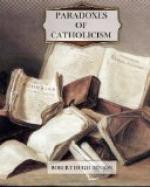Is Reason, then, to be silent henceforth? Why, the whole of theology gives the answer. Did Newman cease to think when he became a Catholic? Did Thomas Aquinas resign his intellect when he devoted himself to study? Not for one instant is Reason silent. On the contrary, she is active as never before. Certainly she is no longer occupied in examining as to whether the Church is divine, but instead she is busied, with incredible labours, in examining what follows from that fact, in sorting the new treasures that are opened to her with the dawn of Revelation upon her eyes, in arranging, deducting, and understanding the details and structure of the astonishing Vision of Truth. And more, she is as inviolate as ever. For never can there be presented to her one article of Faith that gives the lie to her own nature, since Revelation and Reason cannot contradict one the other. She has learned, indeed, that the mysteries of God often transcend her powers, that she cannot fathom the infinite with the finite; yet never for one moment is she bidden to evacuate her own position or believe that which she perceives to be untrue. She has learned her limitations, and with that has come to understand her inviolable rights.
See, then, how the features of Christ look out through the lineaments of His Church. She alone dares to claim an act of Divine Faith in herself, since it is He Who speaks in her Voice. She alone, since she is Divine, bids the wisest men become as little children at her feet and endows little children with the wisdom of the ancients. Yet, on the other hand, in her magnificent Humanity, she has produced through the exercise of illuminated human Reason such a wealth of theology as the world has never seen. Is it any wonder that the world thinks both her Faith and Reason alike too extreme? For her Faith rises from her Divinity and her Reason from her Humanity; and such an outpouring of Divinity and such an emphatic Humanity, such a superb confidence in God’s revelation and such untiring labours upon the contents of that Revelation, are altogether beyond the imagination of a world that in reality, fears both Faith and Reason alike.
At her feet, and hers only, then, do the wisest and the simple kneel together—St. Thomas and the child, St. Augustine and the “charcoal burner”; as diverse, in their humanity, as men can be; as united in the light of Divinity as only those can be who have found it.
So, then, she goes forward to victory. “First use your reason,” she cries to the world, “to see whether I be not Divine! Then, impelled by Reason and aided by Grace, rise to Faith. Then once more call up your Reason, to verify and understand those mysteries which you accept as true. And so, little by little, vistas of truth will open about you and doctrines glow with an undreamed-of light. So Faith will be interpreted by Reason and Reason hold up the hands of Faith, until you come indeed to the unveiled vision of the Truth whose feet already you grasp in love and adoration; until you see, face to face in Heaven, Him Who is at once the Giver of Reason and the Author of Faith.”




